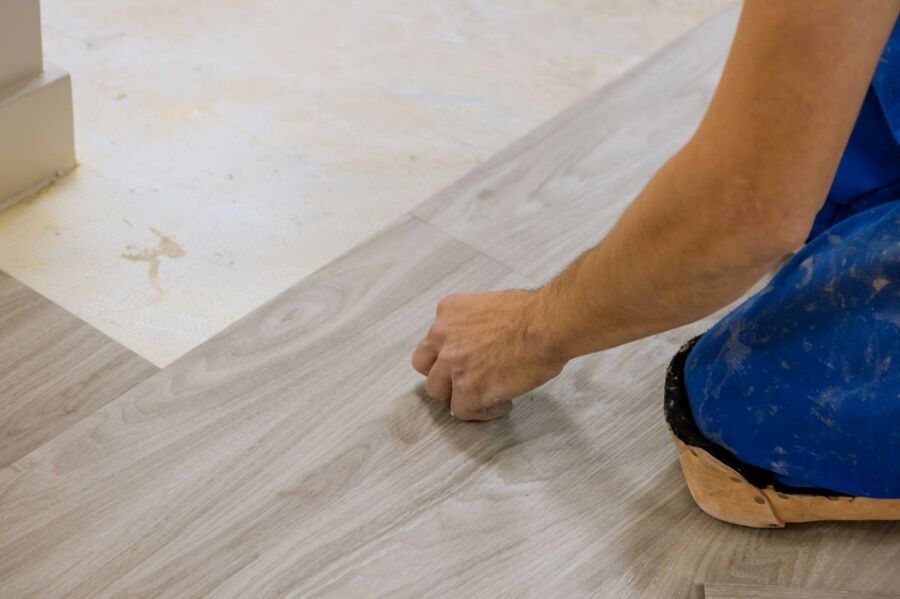Epoxy vs. Concrete, Hardwood, and Tile: Which Flooring is Right for You?

Epoxy Flooring: A Versatile and Durable Choice
Epoxy flooring has emerged as a versatile and highly durable flooring option, suitable for a wide range of applications. It consists of a two-part epoxy resin that, when mixed, creates a strong and resilient surface. Here are some key advantages of epoxy flooring:
1. Durability: Epoxy flooring is exceptionally durable and can withstand heavy foot traffic, making it a popular choice for commercial and industrial spaces. It is resistant to chipping, cracking, and staining, ensuring long-term performance.
2. Aesthetic Versatility: Epoxy flooring is available in a wide variety of colors and finishes. From solid colors to decorative flakes and metallic effects, you can customize the appearance to match your design preferences.
3. Easy Maintenance: Epoxy flooring is easy to clean and maintain. Its seamless surface prevents dirt and liquids from penetrating, allowing for quick and hassle-free cleanup. Regular sweeping and occasional mopping are typically all that’s needed.
4. Chemical Resistance: Epoxy flooring is highly resistant to chemicals, making it suitable for garages, workshops, and industrial settings where spills are common. It can withstand exposure to oils, acids, and solvents without damage.
5. Safety: Many epoxy coatings offer slip-resistant options, enhancing safety, especially in areas prone to wet conditions. Anti-slip additives can be incorporated into the epoxy to reduce the risk of accidents.
1. Durability: Concrete floors are known for their strength and durability. They can withstand heavy loads and are resistant to wear and tear. With proper care, concrete floors can last for decades.
2. Design Flexibility: Concrete can be customized with various finishes, including polishing, staining, and stamping. This versatility allows for a wide range of design options, from a minimalist, modern look to more intricate and decorative styles.
3. Low Maintenance: Similar to epoxy, concrete floors are relatively easy to maintain. Routine sweeping and occasional mopping are usually sufficient to keep them looking their best.
4. Cost-Effective: Concrete is often an economical flooring choice, especially if it’s already in place as the subfloor. Installing a decorative concrete overlay or adding stains can transform plain concrete into an aesthetically pleasing surface without breaking the bank.
5. Porosity: One drawback of concrete is its inherent porosity, which can make it susceptible to staining. Untreated concrete can absorb liquids, leading to potential discoloration if spills aren’t addressed promptly.
1. Aesthetic Appeal: Hardwood floors are cherished for their natural beauty and warmth. They come in a variety of wood species, each with its unique grain pattern and color.
2. Durability: While hardwood is susceptible to scratches and dents, it can last for generations with proper care and maintenance. Refinishing hardwood floors can restore their original luster.
3. Value: Hardwood flooring can increase the resale value of a home. Its classic appeal and durability are attractive to potential buyers.
4. Environmental Considerations: Sustainable hardwood options, such as bamboo and reclaimed wood, are available for environmentally conscious consumers.
5. Maintenance: Hardwood floors require regular maintenance, including periodic refinishing and protection from excessive moisture. They can be susceptible to water damage, making them less suitable for wet areas like bathrooms.
1. Durability: Tile flooring is highly durable and resistant to wear and moisture. It’s an excellent choice for areas prone to spills, such as kitchens and bathrooms.
2. Variety: Tiles offer an extensive range of colors, patterns, and textures. They can mimic the look of natural materials like wood or stone, providing a versatile design palette.
3. Low Maintenance: Tiles are easy to clean and maintain. Regular sweeping and occasional mopping are usually sufficient to keep them looking pristine.
4. Allergen Resistance: Tile flooring is inhospitable to allergens like dust mites and pollen, making it a great choice for allergy sufferers.
5. Coldness: One drawback of tile is its tendency to feel cold underfoot. In colder climates, radiant heating systems can be installed beneath tile floors to address this issue.
Choosing the Right Flooring for You
Selecting the right flooring depends on several factors, including your budget, the specific room or area, your aesthetic preferences, and maintenance requirements. Here are some considerations to guide your decision:
Budget: Epoxy and concrete flooring tend to be more budget-friendly options compared to hardwood and some types of tile.
Usage: Consider the intended use of the space. Epoxy and concrete are ideal for high-traffic areas, while hardwood and tile offer elegance for residential spaces.
Aesthetics: Choose a flooring type that aligns with your design preferences and the overall style of your space.
Maintenance: Assess your willingness and ability to maintain the flooring type you select. Epoxy, concrete, and tile generally require less maintenance compared to hardwood.
Climate: Consider your location and climate. Hardwood may not be ideal for humid areas, while tile is excellent for wet environments.
Allergies: If you have allergies, tile or epoxy flooring may be the better choice, as they are less likely to harbor allergens.
Epoxy Flooring: Offers durability, versatility, and easy maintenance, making it suitable for various applications.
Concrete Flooring: Known for its strength and design flexibility, with options for customization.
Hardwood Flooring: Provides timeless beauty and can increase the value of a home but requires more maintenance.
Tile Flooring: Practical, stylish, and resistant to wear and moisture, with a wide range of design options.
Choosing the Right Flooring: Consider your budget, usage, aesthetics, maintenance, climate, and allergies when selecting the flooring that suits your needs.
